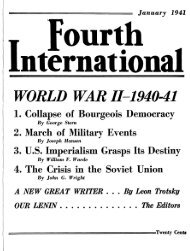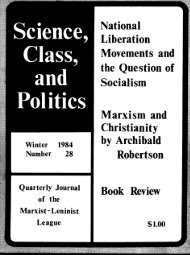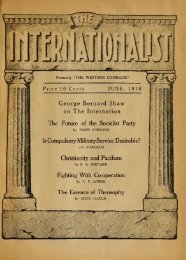The Stalin school of falsification - Marxists Internet Archive
The Stalin school of falsification - Marxists Internet Archive
The Stalin school of falsification - Marxists Internet Archive
Create successful ePaper yourself
Turn your PDF publications into a flip-book with our unique Google optimized e-Paper software.
<strong>Stalin</strong> School <strong>of</strong> Falsification -- Chapter 11<br />
who incessantly keeps lashing the German Communist Party." (Problems <strong>of</strong> Leninism, 1928,p. 171.)<br />
Accordingly, Trotsky was guilty in those days <strong>of</strong> "lashing" Brandlerism and not <strong>of</strong> patronizing it. It is<br />
quite evident from the above to what extent <strong>Stalin</strong> and his Molotov are <strong>of</strong> service in the struggle against<br />
the Rights in Germany!<br />
26. <strong>The</strong> year 1924 is the year <strong>of</strong> the great turn. In the Spring <strong>of</strong> that year, <strong>Stalin</strong> was still repeating the old<br />
for mul~ <strong>of</strong> the impossibility <strong>of</strong> building socialism in one country, especially in a backward country. In<br />
the Autumn <strong>of</strong> that same year, <strong>Stalin</strong> broke with Marx and Lenin on the fundamental question <strong>of</strong> the<br />
proletarian revolution, and constructed his "theory" <strong>of</strong> socialism in one country. Incidentally, <strong>Stalin</strong> has<br />
nowhere developed this theory in a positive form, nor has he even expatiated on it. <strong>The</strong> entire foundation<br />
for it comes down to two quotations from Lenin that have been deliberately given a false interpretation.<br />
<strong>Stalin</strong> has made no reply to a single objection. <strong>The</strong> theory <strong>of</strong> socialism in one country has an<br />
administrative and not a theoretical foundation.<br />
27. In that same year, <strong>Stalin</strong> created the theory <strong>of</strong> "bi-composite," i.e., two-class worker and peasant<br />
parties for the Orient. This constitutes a break with Marxism and with the entire history <strong>of</strong> Bolshevism on<br />
the fundamental question <strong>of</strong> the class nature <strong>of</strong> the party. Even the Communist International found itself<br />
compelled in 1928 to draw back from this theory which has doomed the communist parties <strong>of</strong> the Orient<br />
for a long time to come. But this great discovery continues even today to grace the <strong>Stalin</strong>ist Problems <strong>of</strong><br />
Leninism.<br />
28. In that same year, <strong>Stalin</strong> carried through the subordination <strong>of</strong> Chinese communism to the bourgeois<br />
party <strong>of</strong> the Kuomintang, passing the latter <strong>of</strong>f as a "worker and peasant" party <strong>of</strong> the type he had himself<br />
invented.<br />
<strong>The</strong> Chinese workers and peasants, on the authority <strong>of</strong> the Comintern, were politically enslaved to the<br />
bourgeoisie. <strong>Stalin</strong> organized in China the "division <strong>of</strong> labor" which Lenin prevented him from<br />
organizing in Russia in 1917: the Chinese wcrkers and peasants did the "conquering" while Chiang<br />
Kai-shek did the "fortifying."<br />
<strong>Stalin</strong>'s policy was the direct and immediate cause <strong>of</strong> the shipwreck <strong>of</strong> the Chinese Revolution.<br />
29. <strong>Stalin</strong>'s position and his zigzags on the questions <strong>of</strong> Soviet economic life are too fresh in the memory<br />
<strong>of</strong> the entire world, and, therefore, we shall not dwell on them here.<br />
80. In conclusion, we shall merely recall once again Lenin's "Testament." In question here is not a<br />
polemical article or speech, where one may with some justification presuppose inevitable exaggerations<br />
from the heat <strong>of</strong> the struggle. No, in the "Testament," Lenin, calmly weighing every word, <strong>of</strong>fered his<br />
last counsel to the party, evaluating each one <strong>of</strong> his collaborators on the basis <strong>of</strong> his entire experience<br />
with them. What has he to say <strong>of</strong> <strong>Stalin</strong>? That <strong>Stalin</strong> is (a) rude, (b) disloyal, (c) inclined to abuse power.<br />
Conclusion: Remove <strong>Stalin</strong> from the post <strong>of</strong> General Secretary.<br />
A few weeks later Lenin also dictated a note to <strong>Stalin</strong> in which he announced that he was "breaking <strong>of</strong>f<br />
all personal and comradely relations with him." This was one <strong>of</strong> the final expressions <strong>of</strong> Lenin's will. All<br />
these facts are recorded in the protocols <strong>of</strong> the July 1927 Plenum <strong>of</strong> the Central Committee.<br />
Here are a few milestones in the political biography <strong>of</strong> <strong>Stalin</strong>. <strong>The</strong>y provide a sufficiently distinct portrait<br />
<strong>of</strong> a man in whom energy, will and resoluteness are combined with empiricism, myopia, an organic<br />
http://www.marxists.org/archive/trotsky/works/1937-st2/sf11.htm (11 <strong>of</strong> 12) [06/06/2002 15:07:13]

















